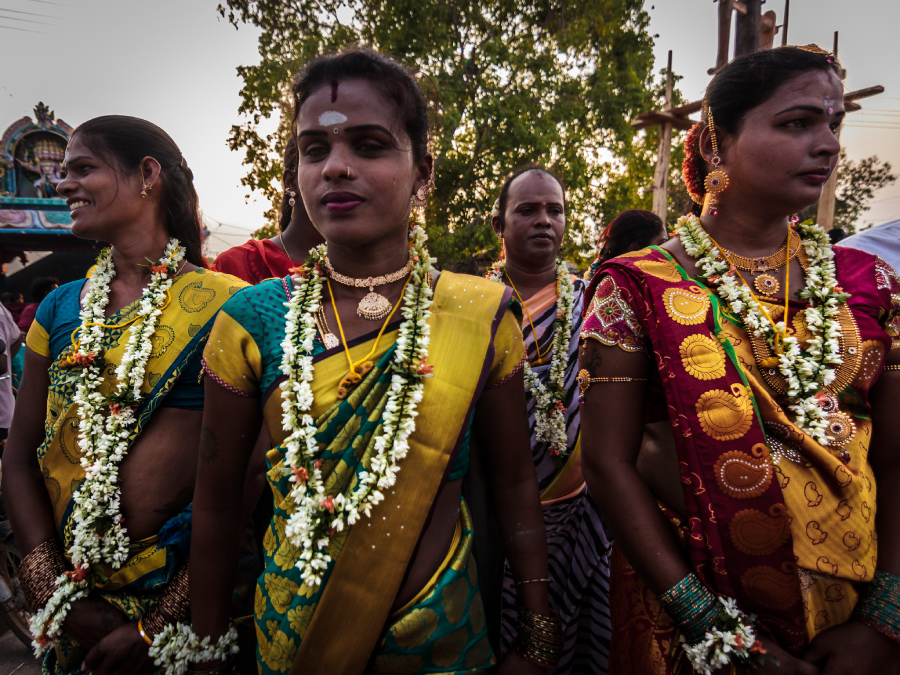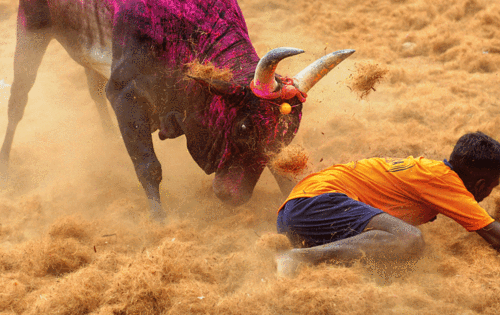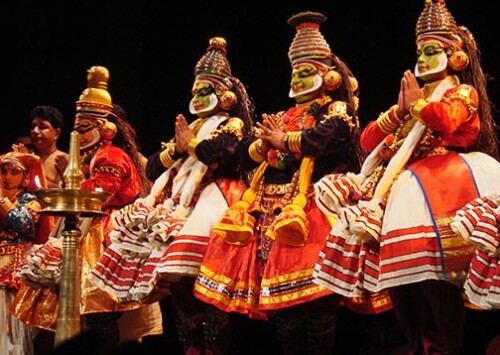Koovagam Festival: Unique transgender identity festival
According to Hindu epic Mahabharata, the Pandavas, during a bloody battle with their cousins to reclaim their kingdom, were forced to sacrifice one of their most valiant soldiers Aravan to be able to win that day. But as the young Aravan was yet unmarried, he asked Lord Krishna, who was helping the Pandavas in the war, that his last wish was to get married before his death. The Lord immediately agreed and Himself took the avatar of a beautiful angel, Mohini, and became Aravan’s bride for the day. The next day, Aravan sacrifices his life and wins the battle for the Pandavas.
The transgenders descend upon Koovagam to become Mohini and get married to Aravan as it is considered auspicious and the transgenders believe that since Krishna took the avatar of a woman despite being a man, He is one of them.
“Getting married to Aravan is a divine power, we feel it every year but unfortunately it is only for one night,” Hashina Nayak, a 45-year-old transgender from Pudukkottai, over 200 km from Koovagam, tells Media India Group.
The Koovagam Festival lasts for 18 days and has a wide variety of activities for the participants. The centre of which is the Koothandavar temple, dedicated to Aravan, where his head is worshipped as the legend has it that the Pandavas had asked Aravan to place his head on top of a hill to watch the battle until it was won.
The first 16 days see several activities like singing, dancing, beauty contests to select Miss Koovagam as well as firewalking. The transgenders also stage street plays to share with visitors the sad reality of their life with the humiliation and discrimination they suffer each day in their life. They also stage the Mahabharata over several days more than 1000 viewers lined up. The drama also helps visitors understand the reasons behind the festival, besides seeing the transgenders like any other human being.
The gathering of transgenders in such a large number is also an ideal occasion for several NGOs to run awareness programmes regarding HIVs/AIDs.
“I have been visiting this temple to celebrate the festival with my group, every year for 23 years. The festival could not be held this year due to the pandemic, but a few of us came here and went to the temple to offer our prayers, but with all precautions,” says Nayak.
One of the most interesting elements of the festival is beauty pageant as winning the title of Miss Koovagam is one the highlights of the festival and the high profile event regularly sees film stars turn up as chief guests to give prizes to the winners.
“When Suchitra from our group won the Miss Koovagam in 2018, we were very happy,” says Nayak proudly.
The transgenders come to the festival not just to participate in the activities but also meet new people, thanks to the thousands that gather every time. “Each year, we meet new people, we create new friends from all over the world who come to celebrate this festival. Since this is the only transgender festival in the world, thousands of others come to see the festival and it makes us feel very happy,” says Nayak.
Koothandavar temple at the centre of festivities
This small, blue temple is the focus point of the Koovagam Festival as several key activities, including the wedding of Aravan with Mohini, take place here. To conduct the wedding, the temple, which has several idols including Mohini and Koothandavar, also has priests who preside over the occasion. Most of the priests have been doing this for generations, even if it is only a part-time activity for them.
“Even our ancestors don’t know for how many generations we have been officiating as priests here,” says Murugan, the 35-year-old priest. When he is not playing the priest here, Murugan works at a diagnostic laboratory in Cuddalore. He says he is happy to help in the festival as it is important.
“We feel privilege to be a part of this kind of festival which is specially for the Unique community,” Murugan tells Media India Group, adding, “the transgender associations help us conduct the festival without any hurdles. They also organise the funds for the festival and provide security and medical facilities.”
The penultimate day of the festival is extremely hectic for the priests as they have to preside as the thousands of transgender participants get married simultaneously. Murugan says he gets help to solemnise the weddings.
“I and two other priests tie the thali (a necklace worn by married Indian women) to all the transgenders. After getting married, they celebrate throughout the day by singing and performing Kummi dances until midnight,” says Murugan.
The next morning all the newly-wed brides arrive at the temple, wearing a bridal costume, and relive their last few moments of being Aravan’s bride by singing and dancing. They also perform several pujas or prayers. The prayers are hectic and over half a dozen gunny sacks of camphor is burnt through the day as the brides celebrate their last minutes of happiness as within a few hours on the same day Aravan will be sacrificed, leaving the thousands of his one-day brides to mourn his inevitable death.
Back to the reality
Once the prayers are conducted and everyone has celebrated to their heart’s content, it is time for the sacrifice of their husband. A giant statue of Aravan is pulled by the locals, through the narrow streets of the village. After travelling over 2 km, when it reaches the neighbouring Pandhaladi village, Aravan’s statue is burnt in a sign of cremation, widowing all his one-day wives.
With the cremation of their husband, it is time for the transgender to live their own reality and deal with the pain of discrimination and humiliation that they face every day. Their necklaces or thalis are snatched, bangles broken and sindoor (vermilion) washed off their forehead. They complete the transformation from a happy newly-wed bride to a traumatised widow by removing their garlands and all jewellery. The transgenders go into a mass mourning together. Beating their chests, wailing loudly, they wear a white saree and become widows for two days.
“We wear white saree and continue to be a widow for two days. On the third day, we worship Aravan and then we perform Annathanam or food distribution to NGOs working with the disabled people. After that we wear our thali and sindoor and dress normally,” explains Nayak.
Living through this experience, the transgenders say that it gives them the unimaginable bliss of being a bride and then brings them face to face with a tragedy that they relive every day of their lives.
“We know that we will never experience the love that a true newly-wed bride gets, but we will forever feel the pain of a bride who has lost her husband,” says Nayak.
Besides being an important festival for transgender identity and to give them blissful, even if mythical, experiences, the Koovagam Festival is significant in many other ways, notably to sensitise the society towards the unfortunate hand that fate has delivered them.
“I still wonder about the way they cry. Are they crying over the death of their mythical husband or are they remembering years of humiliation and discrimination by the society or are the cries outcome of longing for true love,” wonders Palani, a 38-year-old man who has come from Delhi where he works to his native village Koovagam to participate in the festival.
Palani’s connection with the festival goes to his childhood as his father was a priest in the Koothandavar temple. “From my childhood, I have been seeing this festival every year,” Palani tells Media India Group. “It is intense and even strange for me till now. But I feel proud to be part of this festival every year,” he adds.
Over the years the popularity of the festival has increased a lot and a rising number of transgenders from overseas have been turning up, even if to be united in pain and misery that they all go through. “Each and every day, we go through some kind of humiliation by the society, but that’s make us stronger,” says Nayak.













